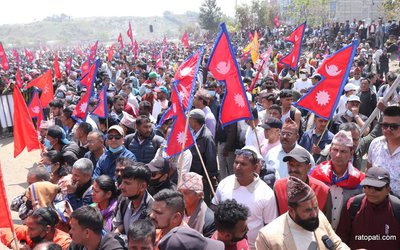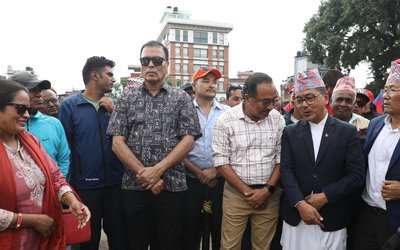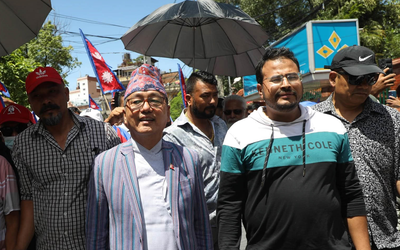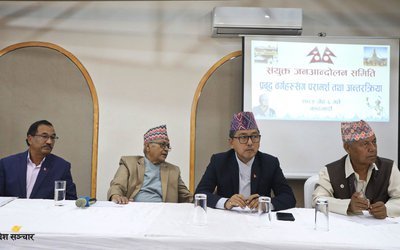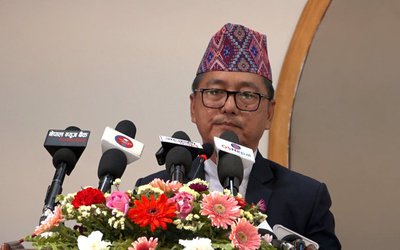Censuring others and adding self value is the common nature of Nepali politics. The politicians believe as much as they blame others they will gain the political supremacy and gain popularity amongst the people. They even do not have a simple idea about how people will ridicule them in turn. Instead of supporting each others' agendas (with intra-party and inter-party) they waste most of their time pulling other's coat's collar.
Simple theory of democratic value i.e., democracies require the free and open debate of political differences, and such debate is only possible where political tolerance prevails. The politician should keep high acceptance and tolerance of non-identical beliefs. In this writing, the term supremacy in politics, indicate the negative connotation that is because common people generally assume; politicians think themselves vastly superior. Most of the illustrations drawn here are taken from mini research finding collected from 5W1H questionnaires on hate speech situations in Nepalese politics.
Nepal has faced long political chaos from the decades. In our 'delicate' democracy we have encountered vertical downs and falls from the beginning. The democracy has been uprooted many times and Nepali people uprooted other non-democratic system to resolve the democracy back in the same breath.
With the struggle, Nepali people have cultivated democratic values and systems in the country many times. I like better call it the 'Jigsaw Democracy', a democracy with its fall and rise. The wrong way to mention is, before the seeds appeared as the democratic system, it is taken away for with no reason. Hence, people have fought to restore democracy many times. They gave many chances to the leaders to rule the nation, the leaders approached Singhadurbar with the promise of change, and they rule people like in the ancient regime. Today, they are elite and became the elite politicians like in bourgeoisie and have taken people as the proletariat as in capitalist accumulation. In this accumulation, they win the game, but the nation loses many achievements and the people are annoyed with its false masking. The country, no doubt, has fallen some fifty to a hundred years back, in comparison to other nations, due to this dawn and fall in democracy. If we calculate the time value of these jumping Jacks on the political system, we have ruined an unrecoverable period from BP's Democracy to KP's Democracy.
While surfing the internet, once I went through the blog post writing, retrieved on 22 Jun 2014, by an Australian MP and Federal Member of Bradfield, about the Ethical Challenges in Politics. In his writing, he discusses ethical issues faced by politicians that he summarizes as politicians' need to keep their feet on the ground, keep their hands out of the till and keep the tanks in the barracks. At that point, we can judge politicians on how they are doing and how they are keeping the tanks.
Another challenge in the political change is that People even know there are always voices raised against reform, and it takes political courage to introduce change. That is why the politicians whom we admire are the reformers. Everyone runs the day to day business. But politicians need to do the work differently. They should bring the change. They must be a reformer. They should have political capital and should invest this capital to deliver better outcomes for the people who elect them. At all costs they should bring meaningful reform to the nation and its people; otherwise, there will always be a question on them.
The power Elite and the Political Architecture of Nepal
In political and sociological theory, the elites are the small group of powerful people who hold a disproportionate amount of wealth, privilege, political power, or skill in society. In a sense, every politician in Nepal is elite since they hold "POWER" disproportionately.
The power elite is a term firstly used by American Sociologist C.W Mills to describe a relatively small, loosely connected group of individuals who dominate the policymaking of a country. This group includes bureaucratic, corporate, intellectual, military, media, and government elites who control the principal institutions in the country and whose opinions and actions influence the decisions of the policymakers. The basis for membership of power elite is institutional power, namely an influential position within a prominent private or public organization.
Mark soma In his writing on 1 Sep 1993 issue of Sage Journal mentions, when human population enter in a new environment, they carry with them old understanding about organizing society. The continued success of the old organizing scheme depends on how well suited it is to the new environment. Of course, remaking the environment is part of the process.
Nepali politicians have entered politics with this stereotypical thinking. We have the wrong architecture in political engineering. As Soma said, they have conventional thinking with a new environment. In the context of Nepal, they change the political environment in their favor when they are in power regardless of peoples' assumption, but they do not adopt the new environment of change. The young generations themselves run with the traditional school system. They sometimes work hard but could not work smart. In this changing technological age, working smarter gives better results than working hard without less or no result. Nepali politics has not given results from the decade. The politicians have ruined the architectural design and structure.
The Ethical Challenge in Politics
Democracy, of course, is a system of procedures by which majorities tend to have their way, which means the majority rules. Liberal democracies require mechanisms of aggregating citizen preferences within majority institutions and this is perhaps the essence of the concept of democracy (Oxfordhandbook.com/dahal, 1989). But democracy is also a system (ibid, p. 411) in which institutionalized respect for the rights of political minorities to try to become a majority must exist.
The beauty of democracy itself is the rules by the majority. In our context, those who get the majority to form the government according to the constitution generally could not make the government according to their will. The opposition and the leaders of the same party start pulling the trigger of their own government. Even the majority could not respect included in democratic values and process. They think the state is ruled by our party and government. In the democracy, whatsoever we should focus its people not their cadre and not their interest. Most of the politicians lack the conscience in this regard.
In Nepalese politics, those who run the government even see the citizens into either its cadre or its obstructionists. Even the opposition party does not play the constructive role of being a watchdog to the government. Always the senior leaders aim to be the prime minister. They could not wait until five years as the people have given mandate them for five years. They think they are the decision-maker. People are none they are tiny carders of each political party.
Ethical Issue: Hate Speech Situation in Nepalese Politics
To most of all, hate speech means expressions or language that is used to offend, humiliate, or discriminate against individuals or groups on the basis that they are of a different nationality, ethnicity or political affiliation. We can place them with greater emphasis on these differences, but differences in race, religion and sexual orientation are also mentioned as a possible basis for the use of hate speech.
In the case of hate speech situation in Nepalese politics, I did a little research from the 5W1H (Who, Where, When, Why, What, and How) approach questionnaire of using hate speech. The common finding from all focus groups is that hate speech is typically used by (Who) politicians of the largest parties. Participants of city areas generally agree that politicians usually use hate speech toward people who have (when) different opinions from them. In Kathmandu valley, participants opine that hate speech is used by politicians (why) to achieve their interests, or to create political divisions between groups or to place political blames. Some participants agreed that hate speech is used by politicians as a means (why) to defame their political opponents and present themselves as superior to others. Overall, participants stated that they hear hate speech very frequently (were) on a live program, political address, news broadcasts and media debates with big satire, irony and political defamatory language, and this was particularly the case during the recent political chaos after the last Poush 5 recommendation to dissolve Parliament by then prime minister KP Sharma Oli or generally at the time of election.
Some participants in the Hills and Mountain area (From judgmental sampling from Dolakha) expressed that in the past the situation was not exposed as much to hate political speech, but now they hear it almost every day (when/how often) on the television and YouTube/social media. Some participants expressed concern about the extent to which political hate speech has an impact on children who are exposed to it. They copy and imitate it funnily; it is habituated so forth like HEPNI, DIS HANNE, COLLAPSE HANDINXU (the derogative terms) etc.
In the research, there were even five participants who stated that they do not watch political speech and programs specifically because they hear hate political speech during the broadcasts. Some say, "We just watch political speech and debate on television and media with hate speech with either this or that name." Participants also claimed to have heard hate speech (where) during opposition parties' protests at Ratna Park and Maitighar. Another common view was that hate speech is spreading with (how) on social media daily, on the profiles of participants' friends and politicians that they follow and they go viral since today's media is the viral power. The social media Tiktok, Facebook, You Tube etc. make them viral and a new generation is forced to acquire them. Recently, the leader of RPP Kamal Thapa, tweeted the recent court Decision as ADALATHMA GORU BYAYO. They are just some tiny examples but resemble the language of a leader.
The Futurology: Looking back Moving Forward Approach
The period from BS2007 to 2072 was difficult and we did not have any constant politics because of different political turmoil at different times. At such times reforms were not easy to implement. The few reforms made, even did not deliver a substantial benefit to the democracy, particularly for the people. Today we are seeing a similarly intense debate over the future of the country. It is still not vivid but it is being blurred day by day. In the eyes of the people, it proved that parties and the government could not make the right decision or they make the wrong decision and these were corrected by the Supreme Court.
When every action and the steps of a country when the government fails, the state itself goes into the failure state. Every apparatus of the state actors fails on its action. In the book 'Why Nations Fail', authors Daron Acemoglu and James Robinson note that economic growth can progress "only if not blocked by the economic losers who anticipate that their economic privileges will be lost and by the political losers who fear that their political power will be eroded." In the same way, today we have the ethical challenge of decision making.
Failing is one thing, but never trying to surpass the difficulties is fatal. The political agendas fail, and so fail the politicians.
Today, the biggest ethical challenge in politics is the disengagement of citizens from the political process. In Nepal, people and the general public think it is not better to engage in politics. They do not take it as a clean game. A healthy democracy depends on informed and engaged citizens playing an active role in the political process – and the recognition that being a citizen in a well-functioning democracy is a responsibility as well as a right. So if we see the future of Nepalese politics both utopian and dystopian components in front.
Who so ever plays must score the goal is another bizarre concept. No one thinks of passing it to the others forgetting it’s a team game. Consequently, short sightedness of the leaders and unbelieving the next generation for leadership is also hindering the upward movement. Likewise, disorientation of the learned society form the politics also plays role to be ruled by the silly notions. Still, the 'ball' is in the hand and it is our effort to shape it in a better future. We should travel to the next peak looking back our fall. That's That.
Bhoj Kumar Dhamala, (M.A/M.Phil in English), is a Principal of Zone Academy, Boudha,
- Bangladesh, Sofya, And Cox Market
- Jun 18, 2023
- Ranajit Ray’s “Kathmandu Dilemma” Maneuver
- Oct 26, 2021

